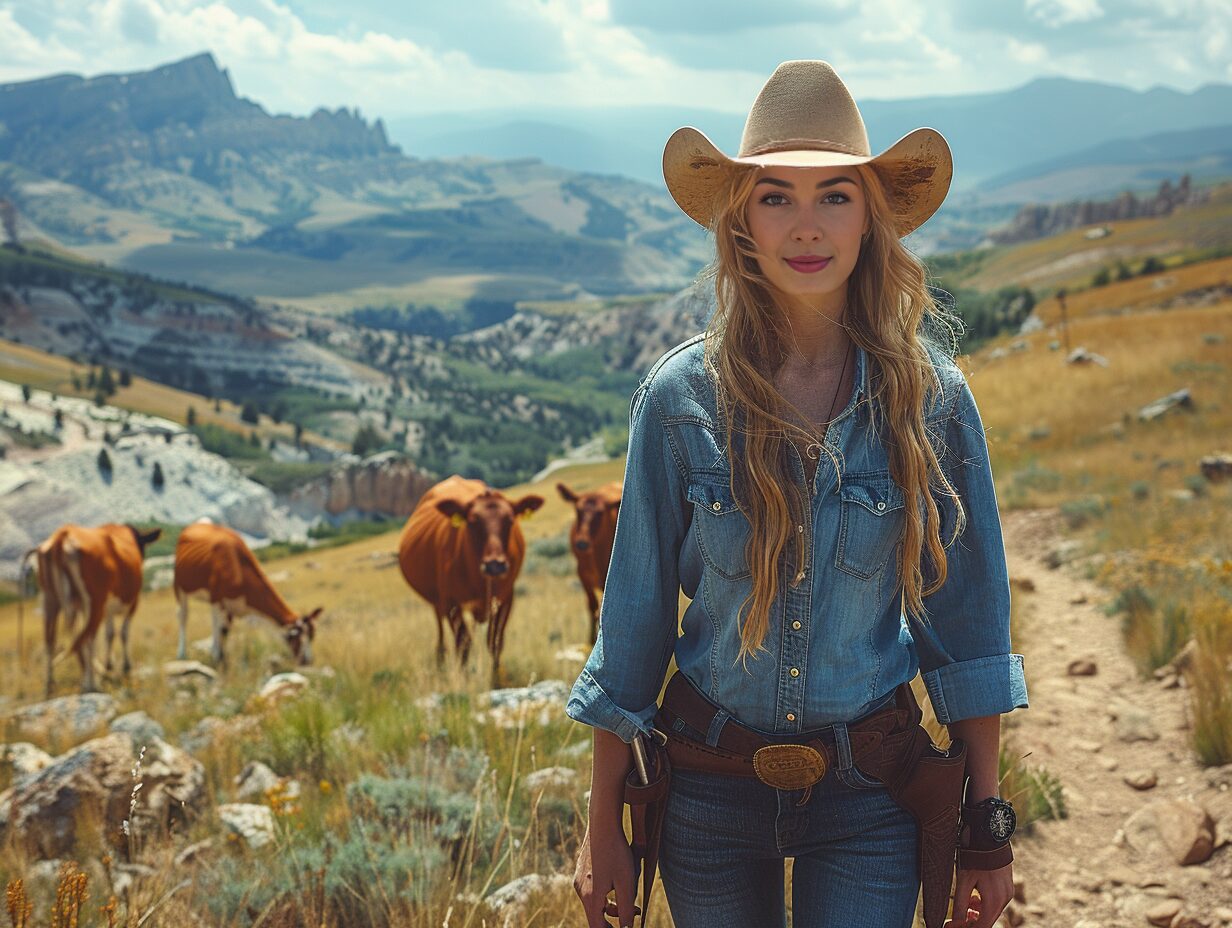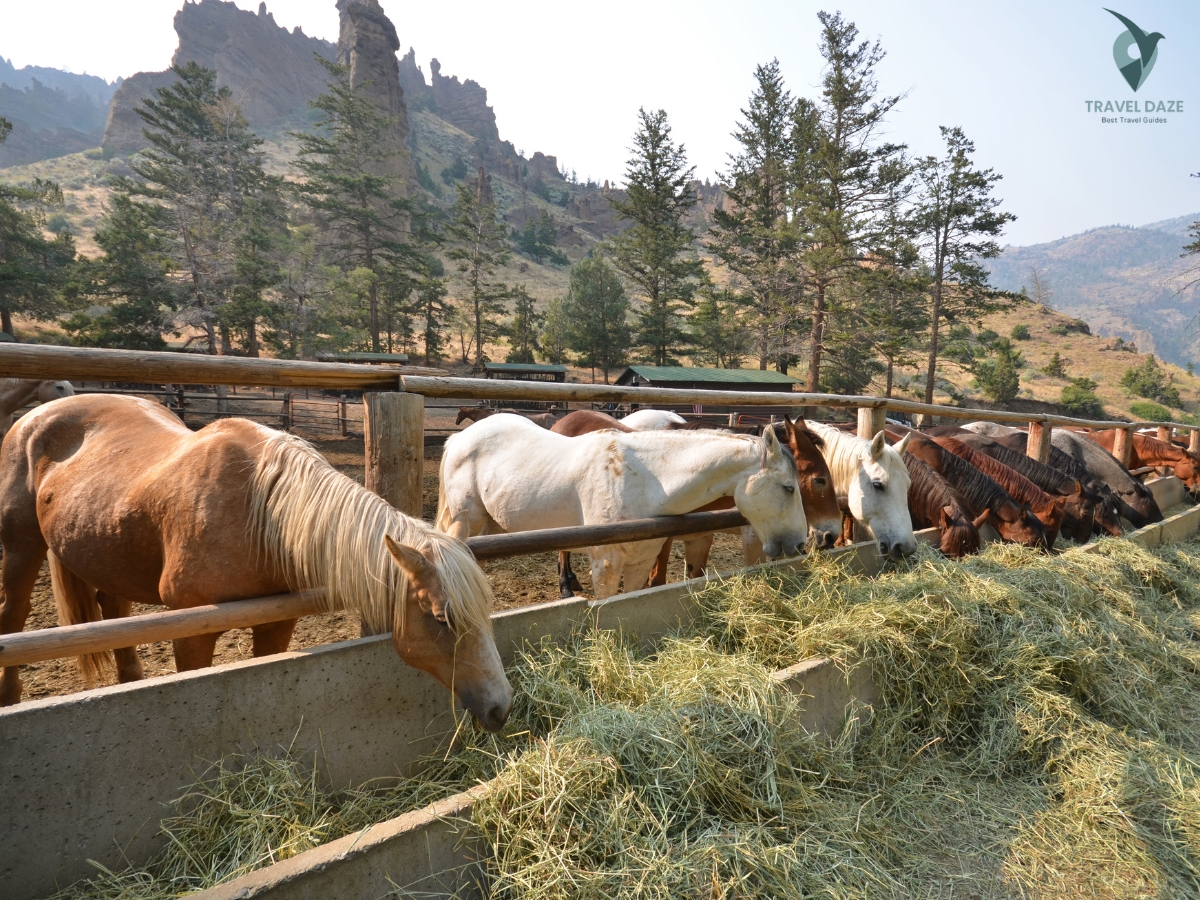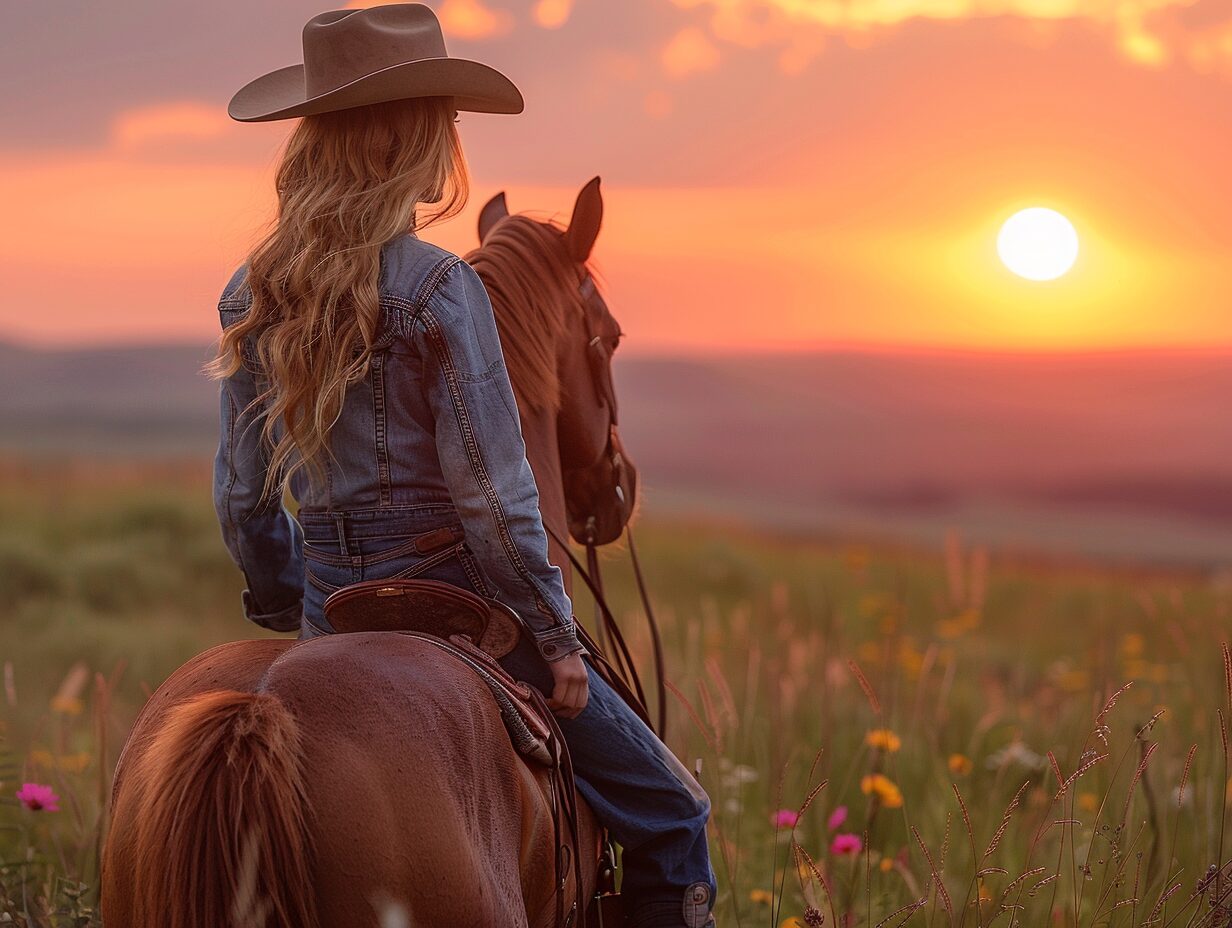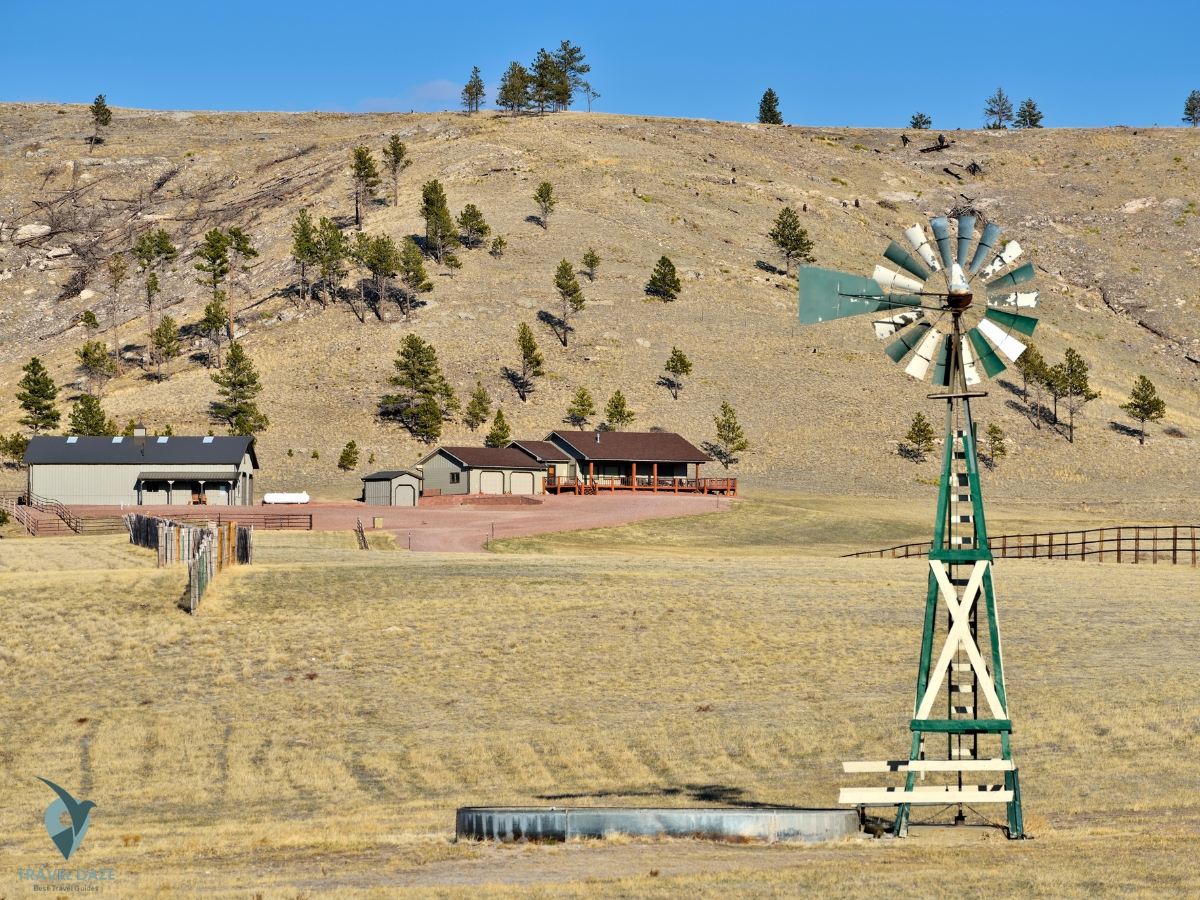Think of the cold, crisp air in Wyoming, which is just like the work that you do every day on a ranch. It’s been my life for a while—switching city lights for starry nights, learning the ropes in a place where calluses are your daily bread and horses become your trusted friends. This is a journey that changes people from city dwellers into experienced wranglers.
Table of Contents
ToggleAs a child, I looked up to cowboys and wanted to be like them, but nothing could have prepared me for the hard work of herding cattle or fixing fences until the sun went down over the horizon.
I realized that working on a Wyoming ranch was more than just a job when I faced a stubborn sheep on my first day with nothing but a lasso and a strong will. It was an adventure full of tradition and hard work.
It hurt in places I didn’t know existed, but every morning brought the promise of new skills to learn and views that paintings could never capture.
From saddling up at dawn to making sure the animals do well, showing that this isn’t just work; it’s essential to keeping the heartland’s spirit alive.
Watch this space for pictures of my life on the ranch, where tough and beautiful meet, and every sunset brings stories worth telling around a warm fire.
Important Things You Need to Know
On the ranches in Wyoming, I noticed how close everyone was to each other. It’s not just about riding horses and seeing cattle. From what I’ve seen, the ranchers work together closely, sharing resources and information to make sure that everyone does well. This teamwork is especially important when it’s time to brand animals or herd animals across large areas.
The scenery in Wyoming is both beautiful and difficult. I’ve seen how quickly ranchers have to adjust when the weather changes without warning. They care about and understand their environment. They know that a sudden snowstorm or dry spell can make it hard to work with the cattle and hurt the land’s health.
I learned how important it is for farming to be environmentally friendly while working on a ranch in Wyoming. Ranchers often switch out grazing areas so that they don’t get too used. They also spend money on practices that protect water sources and soil quality. I believed their dedication to preserving nature’s balance was critical for their long-term productivity.
Many people may find the idea of being a cowboy romantic, but I’ve learned that it takes a lot more work and dedication than what you see in movies. Early in the morning and late at night, often in harsh conditions, one must fix fences, check for sick animals, and manage feed.
Even though technology has improved, traditional skills are still very important on Wyoming ranches. I’ve seen experienced cowhands use lassos and steer horses through rough terrain with great skill. These tried-and-true methods, passed down from generation to generation, are keeping a big part of Wyoming’s cultural heritage alive.
My morning routine on a ranch in Wyoming
Working on a ranch makes you understand what it means to say “sunup to sundown.” As the first light comes up over the vast landscape of Wyoming every morning, I get ready for a day of hard but rewarding work.
The open fields and the tall peaks in the distance seem to be the only places where the air is crisp. Riding horses isn’t just a fun thing to do around here; it’s also an important way to get around.
As much as I work with the other ranch hands, my trusty horse is like one of them. He helps me check on faraway fence lines and move cattle to new grazing grounds.

Challenges and rewards for each season
My responsibilities on the ranch change a lot as the seasons change. Babies are born, and buildings that were damaged by the harsh winter are fixed up in the spring. I’ve learned that hidden behind a ranch’s peaceful exterior is a hive of activity that most people don’t know about.
In the summer, I’m knee-deep in hay, harvesting and storing it for the winter. I really understand what it means to “make hay while the sun shines” during these long days.
Community and solo work
The strong sense of community is one thing I love about this way of life. Strangely enough, there are times when we may not see another living soul, but when we do, those times are powerful because we have a common goal.
As we sit down to eat, we tell each other stories, and the laughter and banter show how close we are after working hard together. But when I work alone, like when I fix a saddle with focused attention or when I look over the land with a meditative mind, I feel a deep connection with both the world and myself.
Applying modern techniques
Contrary to popular belief, ranch work is not outdated. To increase our output, we use modern farming methods and technology. Drones, for example, simplify the task of monitoring our vast expanses of fields and livestock.
By using these new ideas, I’ve seen our yield and stock health get better, which makes me even more sure that tradition and progress can live together in peace.
Education through hard work
As I work with the cattle and horses every day, I see firsthand how the ecosystem and life depend on each other. Agriculturalists’ numbers show that the ranching industry is very important to the economy, and I can see why.
With every calf we raise and crop we harvest, I learn more about how important it is for us to take care of people not only in our own community but also in places far away.

Physical and emotional grit
It’s impossible to say enough about how hard ranch work is on the body. Working with animals that are many times heavier than me all the time has given me strength that goes beyond muscle.
This hard work has given me emotional grit. It breaks our hearts when we lose a sick animal despite our best efforts. The only things that make up for it are the joys of a healthy birth and the gratitude of an animal you’ve nursed back to health.
Reverence for the Ranching Heritage
And finally, I have a lot of respect for the farmers and ranchers who came before me. Every aspect of the trade incorporates rituals and practices passed down from generation to generation.
Even though I use modern information in my work, I always draw from the rich tradition that gives ranch work its long-standing reputation.
What Are My Tips for Aspiring Ranch Workers?
Enjoy the early hours of the morning; they set the tone for your day.
It’s worth putting in the extra hours because there’s nothing better than knowing you did a great job.
You can always learn something, even from things that seem unimportant. There’s information to be found everywhere.
Build up your physical and mental toughness; it’s essential for ranch life.
Take care of the connections you’ve made with the land and people in the community; they will help you.
Last Thoughts
Ranch work in Wyoming is a look into a way of life that values the close connection between people, animals, and the land. Every day presents fresh challenges that require resolution. It’s a life that requires being strong and creative.
The stories I’ve gathered from ranches all over the state show how strong people can be and how close communities can become despite hard work and a lot of wilderness.
Whether you’re herding cattle under the big sky of Wyoming or fixing fences as the sun goes down, these experiences give you a sense of purpose and place that stays with you long after you take off your boots.
FAQ
What types of jobs are available on Wyoming ranches?
Ranches in Wyoming have a range of jobs, from general ranch hands and wranglers to more specialized jobs like animal health technicians and agricultural management. Whether you’re responsible for caring for animals, repairing broken equipment, or monitoring crop production, each job on the ranch demands a unique set of skills.
Do I need to have ranching experience to work in Wyoming?
Even though experience is helpful, many ranches in Wyoming offer training on the job to people who are eager to learn. A strong work ethic and a real desire to live on a ranch often make up for a lack of experience.
What’s the typical work schedule on a Wyoming ranch?
The days on a ranch last from dawn until dusk, so life starts early. Working long hours, sometimes seven days a week, is a necessity, particularly during busy times such as the birth of cows or the harvest of crops. Things on the ranch move at a pace dictated by nature and the animals’ needs.
Is there room for career growth in ranch work?
Of course. As you get more experience and show off your skills, chances come up to take on more responsibility or specialize in certain areas of ranching, like managing your herd or running an agricultural business.
How do I adapt to the remote lifestyle of a Wyoming ranch?
To enjoy the peaceful but remote Wyoming ranch setting, you need to love big open spaces and be able to take care of yourself. People on the ranch are very close to each other, and individuals often spend their free time outside doing things like horseback riding, hiking, and going to community events. The surrounding landscape offers breathtaking views and plenty of opportunities to disconnect from the hustle and bustle of city life. While the ranch lifestyle emphasizes simplicity and self-sufficiency, there are times when a trip to town is necessary, and knowing a few Jackson Wyoming shopping tips can come in handy. Whether it’s finding the best local shops for outdoor gear or unique souvenirs, a little preparation can make your visit to this charming town even more enjoyable.
What should I know about the weather conditions in Wyoming?
Get ready for a wide range of weather conditions in Wyoming, from hot summers to cold winters. To deal with sudden changes in weather and temperature, you need to wear layers of clothing and protective gear.
Will I receive training in ranch-specific machinery and tools?
Most ranches will teach you how to use the tractors, balers, and other farming tools specific to their business. Safety is very important, so you will get a lot of training before you do anything on your own.
Are there any cultural aspects I should be aware of when working on a ranch?
Ranching has a lot of history behind it, and people who do it often feel very proud of the Western way of life. It’s very important to respect the land, the animals, and the local customs. While you’re there, you’ll probably learn a lot about the history and traditions of the area.
What are the living arrangements typically like on a ranch?
There are different types of rooms, from shared bunkhouses to private cabins, depending on the size and rules of the ranch. Living on-site is common and a practical way to deal with the early start times. It also brings people closer together in the ranch community.
Can working on a Wyoming ranch impact my overall well-being?
Many people find that the physical nature of ranch work and the beautiful, peaceful scenery are very good for their physical and mental health. Living on a ranch can be a nice break from the busy city life because of how simple and steady life is there.






